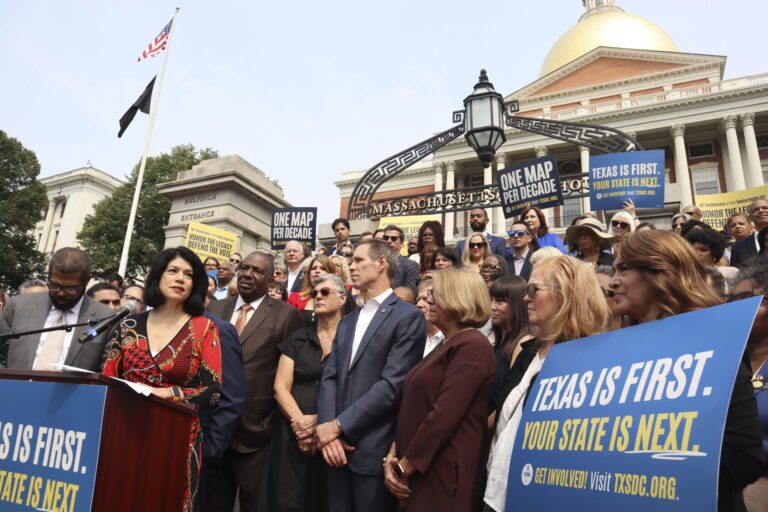Redistricting and Gerrymandering: Political Turmoil in America
The ongoing battles over redistricting and gerrymandering have escalated dramatically, drawing national attention as Republicans intensify their efforts to reshape congressional voting maps to their advantage. This contentious issue is igniting fierce reactions across various states.
Escalation of Redistricting Conflicts
On a particularly chaotic Wednesday, events unfolded quickly. A bomb threat led to the evacuation of Texas Democrats who had fled their state in opposition to a controversial redistricting bill, which prompted a temporary halt at their Chicago-area hotel. In an unexpected move, former President Donald Trump announced his intention to send Vice President Vance to Indiana to lobby for a redrawn congressional map.
South Carolina’s Bold Move
In South Carolina, Congressman Ralph Norman, who is vying for the governor’s seat, urged the state legislature—controlled entirely by Republicans—to revise district lines aimed at unseating Congressman Jim Clyburn, the state’s only Democrat and a prominent African American lawmaker. Norman emphasized:
“We have Republican supermajorities in South Carolina. Let’s use them to create more competition in our congressional seats. I am confident that Republicans can win in every part of our state.”
This push aligns with a broader strategy to bolster Republican representation in Congress, enhancing support for President Trump’s agenda.
The Glaring Imbalance in Districts
The 6th congressional district, represented by Clyburn since 1993, was initially gerrymandered in the 1990s to empower Black voters. It remains the only majority-Black district in South Carolina, showcasing the impact of historical gerrymandering efforts.
Florida’s Strategic Moves
Meanwhile, Florida Republican legislators are gearing up to reconsider congressional maps. A proposal gaining traction aims to create 15 districts favoring Republicans while leaving only nine to Democrats, setting the stage for further political maneuvering over the next decade.
A Nationwide Reaction
The turmoil sparked by Texas Democrats fleeing their state has incited reactions beyond state lines. In New York, Governor Kathy Hochul declared:
“Here in New York, we will not stand on the sidelines with the timid souls… This is a war… We must do the same.”
This declaration underscores the escalating nature of the conflict, with Hochul framing gerrymandering as a tactical response to Republicans’ aggressive redistricting initiatives.
Voices from the Past
Former President Barack Obama reemerged in the discourse, urging Democrats to combat Republican efforts that he termed a "power grab" undermining democracy. His advocacy for redistricting reform aligns with ongoing efforts spearheaded by the National Democratic Redistricting Committee, founded by Obama and former Attorney General Eric Holder.
Reflecting on Historical Context
As Democrats bemoan the practice of gerrymandering, it is noteworthy that the technique originated from past Democratic strategies. Congressman Byron Donalds of Florida pointed out:
“Gerrymandering — like the Ku Klux Klan, segregation, and Jim Crow — are creations of, you guessed it, the Democrat Party.”
His remarks serve as a historical reminder that gerrymandering is not a new problem, but rather part of a long-standing political strategy.
California’s Urgent Redistricting Agenda
In a bid to capitalize on the political momentum, California Governor Gavin Newsom announced his intention to initiate redistricting that could yield five additional Democrat-leaning districts ahead of the upcoming midterm elections. With a tight timeline, the state legislature must declare a special election on redistricting by August 22 to ensure inclusion on the November 4 ballot.
Conclusion: A Political Firestorm
The ongoing battles over redistricting and gerrymandering highlight the fierce contention within American politics. With states like Texas, Florida, New York, and California embroiled in these debates, the implications could significantly shape the balance of power in upcoming elections. As both parties strategize to leverage their strengths, the future of congressional maps hangs in the balance.
For more insights on gerrymandering and its effects on politics, check out additional resources on sites dedicated to political reform and election integrity.


